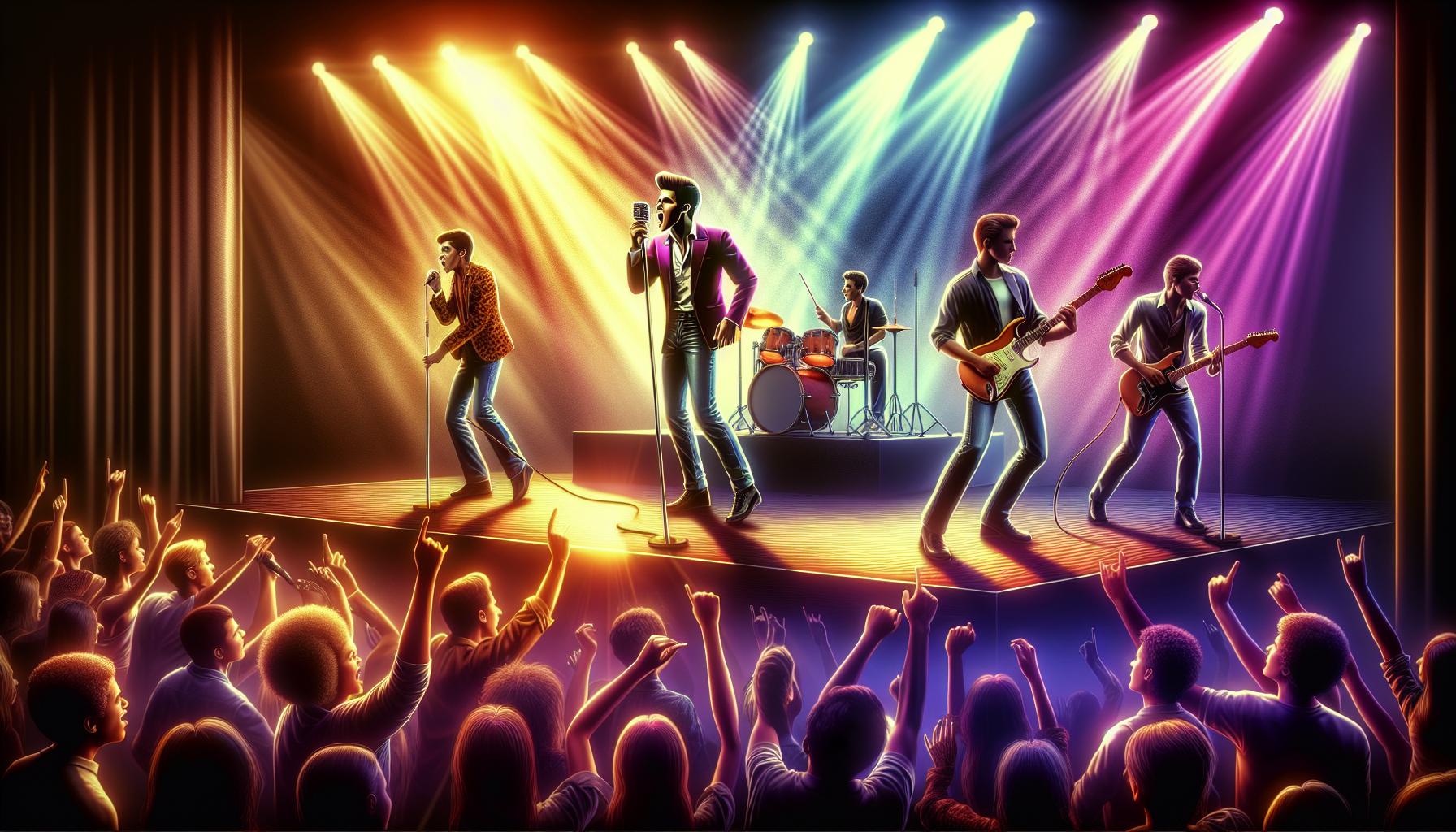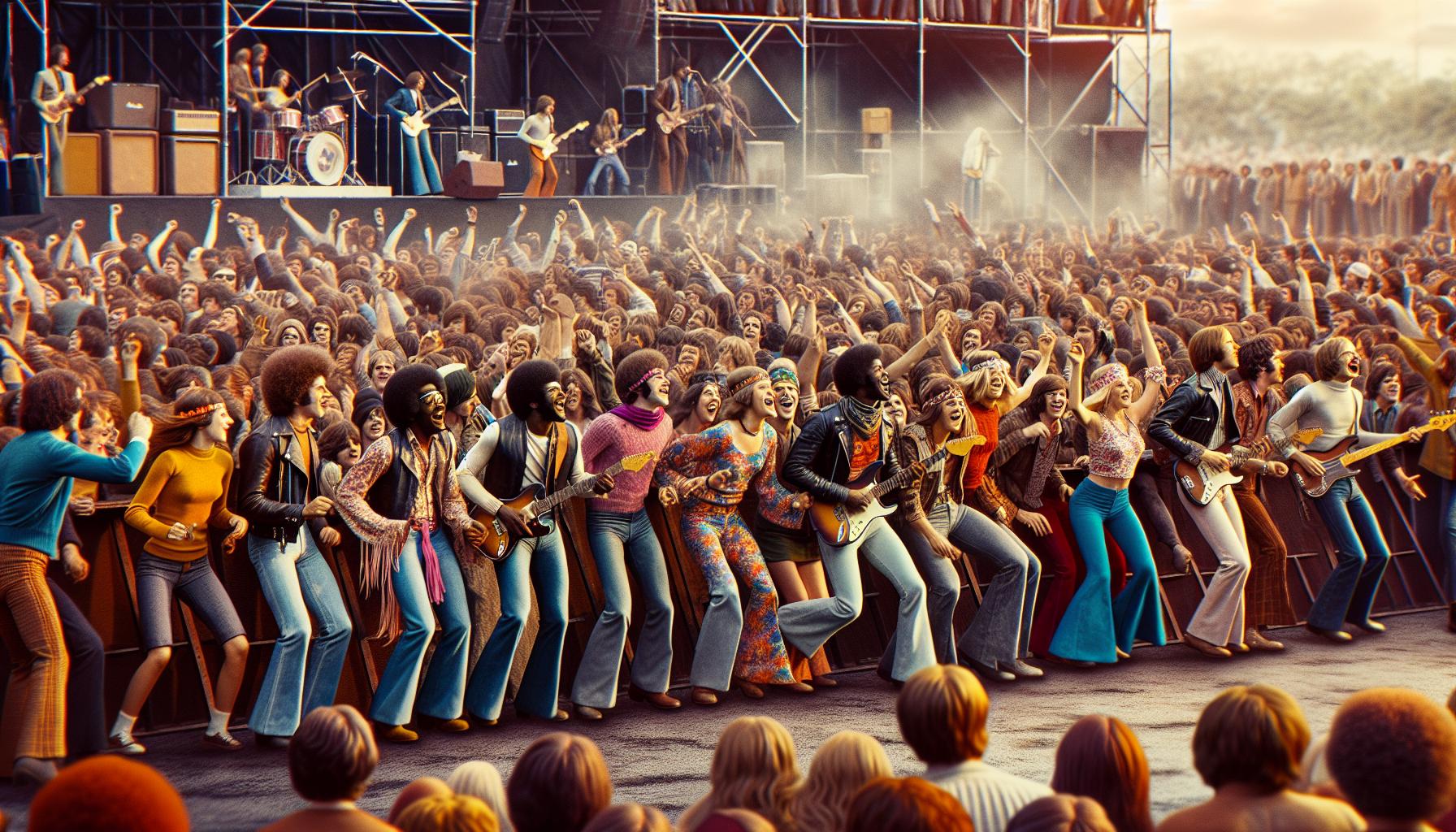Rock music has shaped culture and influenced generations since its explosive emergence in the mid-20th century. Blending elements of rhythm and blues, country, and jazz, it created a sound that resonated with youth and challenged societal norms. From the rebellious spirit of early pioneers to the diverse subgenres that followed, rock music tells a story of innovation and evolution.
As it evolved, rock music became a powerful voice for change, addressing social issues and personal struggles. Iconic bands and artists pushed boundaries, leaving an indelible mark on music history. This journey through rock’s rich past reveals not just the evolution of sound but also the cultural shifts that defined each era, making it a fascinating subject for music lovers and history buffs alike.
Key Takeaways
- Origins and Influences: Rock music originated in the mid-20th century, drawing from rhythm and blues, country, and jazz, setting the stage for its cultural impact.
- Decade Evolution: The genre evolved significantly, with defining moments such as the 1950s rock and roll explosion, the British Invasion in the 1960s, and the rise of grunge in the 1990s.
- Iconic Artists: Key figures like Elvis Presley, Chuck Berry, The Beatles, and Nirvana have shaped rock music, each contributing unique sounds and philosophies to the genre’s development.
- Cultural Impact: Rock music has served as a voice for social change, addressing important issues and influencing popular culture through its lyrics, fashion, and powerful performances.
- Modern Relevance: Contemporary rock artists continue to draw inspiration from legendary influences while innovating within the genre, ensuring its ongoing appeal to new generations.
Rock Music History
Rock music’s origins trace back to a blend of various genres that paved the way for its emergence in the mid-20th century. The fusion of rhythm and blues, country, and jazz created a new sound that resonated with the youth.
Early Influences
Early influences on rock music include rhythm and blues, country music, and folk traditions. Rhythm and blues, characterized by its strong backbeat and soulful vocals, provided a foundation for many rock songs. Artists like Chuck Berry and Little Richard showcased this influence in their energetic performances. Country music introduced elements like storytelling and instrumentation, with artists such as Johnny Cash incorporating these features. Additionally, folk music’s influence, particularly in the 1930s and 1940s, helped shape the lyrical themes that rock musicians would adopt.
Birth of Rock and Roll
The birth of rock and roll emerged in the United States during the late 1940s and early 1950s. In 1951, DJ Alan Freed coined the term “rock and roll,” promoting the genre through radio shows. Artists like Elvis Presley, often called the “King of Rock and Roll,” brought the genre into mainstream culture. Presley’s blend of rhythm and blues with a pop sensibility attracted a broad audience. The combination of electric guitars, swing rhythms, and rebellious lyrics defined early rock and roll, igniting youth culture and setting the stage for future developments in the genre.
Evolution Through the Decades

Rock music’s history shows a dynamic transformation across various decades, each contributing unique elements to the genre’s development.
1950s: The Birth of Rock
The 1950s marked the official emergence of rock and roll, driven by a fusion of rhythm and blues with country elements. Artists like Chuck Berry and Little Richard pioneered energetic performances and catchy melodies that captivated audiences. The introduction of electric guitar riffs and backbeats became signature features, influencing youth culture and encouraging dance trends like the twist. Elvis Presley, often dubbed the “King of Rock and Roll,” popularized the genre with hits like “Heartbreak Hotel,” bringing rock into mainstream America.
1960s: The British Invasion
The 1960s witnessed the British Invasion, as British bands like The Beatles and The Rolling Stones reshaped rock music. The Beatles’ innovative songwriting and studio techniques revolutionized music production, while The Rolling Stones introduced a rawer, more rebellious sound. This period emphasized experimentation with various genres, leading to the birth of subgenres such as folk rock and psychedelic rock. The influence of social movements found expression in the lyrics, reflecting the era’s cultural shifts.
1970s: Genres and Experimentation
The 1970s saw rock diversify into multiple genres, including hard rock, punk rock, and progressive rock. Bands like Led Zeppelin and Pink Floyd showcased elaborate musicianship and concept albums. The punk movement, spearheaded by The Ramones and Sex Pistols, rebelled against mainstream conventions, prioritizing short, fast-paced songs and a DIY ethic. This decade also notably introduced the arena rock phenomenon, where bands performed in large venues, further expanding their audience reach.
1980s: Mainstream Success
The 1980s brought heightened mainstream success with the development of MTV, promoting music videos as a key marketing tool. Rock bands like Bon Jovi, Guns N’ Roses, and U2 achieved massive commercial success, blending catchy hooks with powerful imagery. This decade also saw the emergence of glam metal, characterized by flamboyant styles and theatrical performances. Notable events like Live Aid in 1985 underscored rock’s capacity for social impact, uniting artists in support of humanitarian causes.
1990s: Grunge and Alternative Rock
The 1990s introduced grunge and alternative rock, with bands like Nirvana and Pearl Jam leading the charge. Grunge, rooted in Seattle’s music scene, featured a raw sound and themes of disillusionment. This era marked a shift away from the polished production of the 1980s, favoring authenticity and emotional expression. Alternative rock gained mainstream traction, with bands like Radiohead and R.E.M. gaining acclaim for their innovative approaches and introspective lyrics, setting the stage for future musical explorations.
Iconic Rock Bands and Artists

Iconic rock bands and artists have shaped the genre, leaving a lasting impact on music and culture. Their contributions define rock’s evolution across decades.
Foundations of Rock Legends
Foundational rock legends established the genre’s core sound and ethos.
- Elvis Presley: Known as the “King of Rock and Roll,” he popularized rock music in the 1950s, blending country and rhythm and blues. His energetic performances and iconic songs like “Jailhouse Rock” showcased a new rebellious spirit.
- Chuck Berry: Often hailed as the “Father of Rock and Roll,” his guitar riffs and storytelling songs, such as “Johnny B. Goode,” influenced countless musicians. He infused rhythm and blues with a sense of fun, helping to create the blueprint for rock music.
- The Beatles: This British band revolutionized rock in the 1960s with their innovative songwriting and recording techniques. Albums like “Sgt. Pepper’s Lonely Hearts Club Band” pushed artistic boundaries and changed perceptions of popular music.
- The Rolling Stones: Known for their raw energy and rebellious image, they helped define rock’s attitude. Their energetic hits, including “Satisfaction,” cemented their legacy as rock icons, blending blues influences with rock.
Modern Influences in Rock
Modern rock artists draw inspiration from classic legends while pushing the genre forward.
- Nirvana: Emerging in the 1990s, they popularized grunge through their emotionally charged lyrics and raw sound, impacting alternative rock significantly. “Smells Like Teen Spirit” became an anthem for disenchanted youth.
- Foo Fighters: Formed by Nirvana’s drummer Dave Grohl in the late 1990s, they combined hard rock with melodic sensibility, producing hits like “Everlong.” Their sound represents the continuation of rock’s evolution and appeal.
- Paramore: This band revitalized pop-punk in the 2000s, with energetic performances and relatable lyrics. Tracks like “Misery Business” exemplify modern rock’s connection to youth culture.
- Coldplay: Known for their emotive music and atmospheric sound, they blend rock with pop and alternative influences. Albums like “A Rush of Blood to the Head” showcase their ability to connect with a wide audience while maintaining rock’s emotional core.
Cultural Impact of Rock Music

Rock music serves as a powerful cultural force, influencing various aspects of society and personal expression. Its ability to challenge norms and inspire change highlights its significance in shaping popular culture over the decades.
Rock Music and Social Change
Rock music embodies a voice of social change, often addressing pressing issues like civil rights, war, and identity. Artists such as Bob Dylan and Joan Baez used their music to protest against injustices during the civil rights movement and the Vietnam War. The genre’s rebellious spirit resonated with marginalized communities, fostering solidarity and encouraging political activism. Songs like “For What It’s Worth” by Buffalo Springfield epitomize this activism, capturing the sentiments of the time and igniting a desire for change. Punk rock in the 1970s further amplified this message, with bands like The Clash advocating for political awareness and social critique.
Rock Music in Popular Culture
Rock music’s influence permeates popular culture, evident in film, fashion, and youth culture. Iconic films like The Graduate and Easy Rider utilized rock soundtracks to reflect generational tensions. Fashion trends inspired by rock musicians, such as leather jackets and ripped jeans, continue to shape youth style. Additionally, memorable performances at music festivals like Woodstock cemented rock’s status as a cultural phenomenon. The genre’s legacy also persists in contemporary media, with rock songs frequently featured in commercials, television shows, and movies, reinforcing its lasting appeal and relevance in modern society.
Rock music’s journey through history reveals its profound influence on culture and society. From its roots in rhythm and blues to its role as a voice for social change, the genre has continually evolved while inspiring countless generations. Iconic artists and bands have pushed boundaries and challenged norms, making rock a powerful medium for personal expression and activism.
As rock music continues to adapt to contemporary trends, its legacy remains undeniable. The genre’s ability to resonate with listeners on emotional and societal levels ensures that it will endure, shaping the musical landscape for years to come. Rock music is not just a genre; it’s a cultural phenomenon that reflects the spirit of its time and the voices of those who dare to challenge the status quo.
